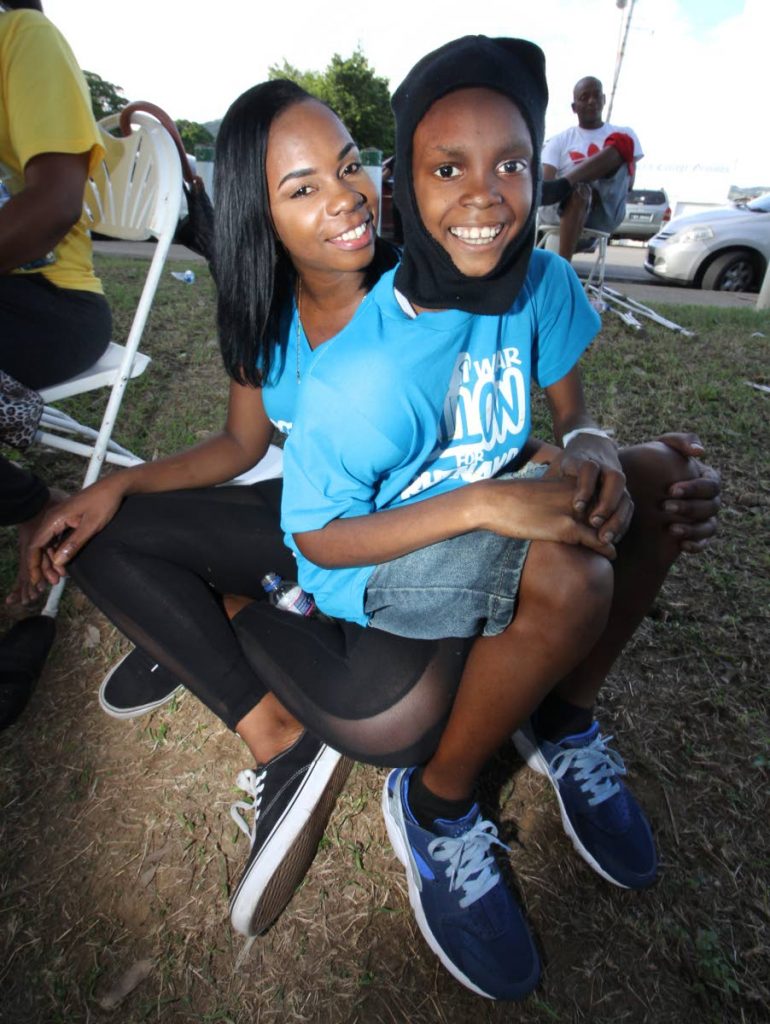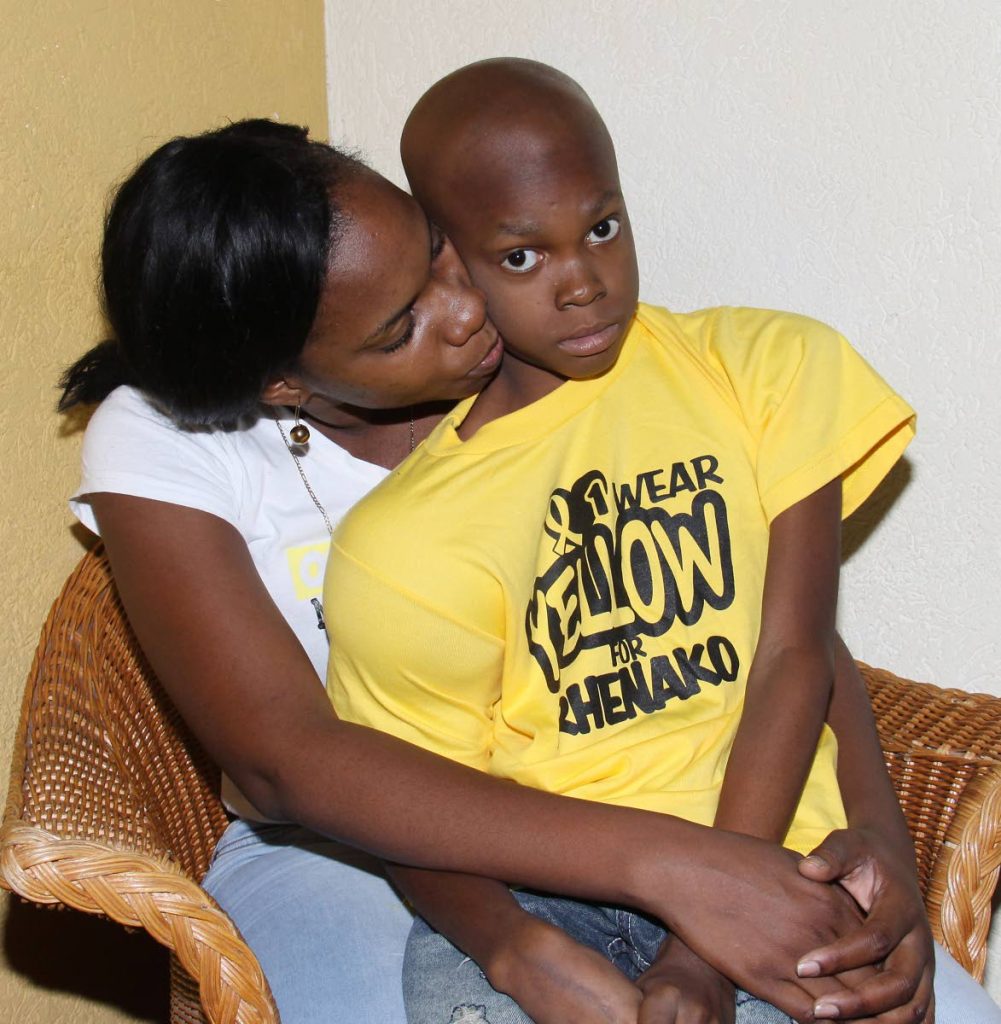Rhenako back to square one

It’s back to square one for Teniesha Elder and her son Rhenako Beard, ten, as they are no longer heading to Colombia for Rhenako’s osteosarcoma treatment.
Rhenako and Elder were supposed to travel to Colombia last Monday where he would receive treatment from a team of oncologists at Clinica de Occidente in Cali, and hopefully save Rhenako’s arm from being amputated.
Elder was told by local and US doctors that Rhenako should undergo chemotherapy and have his arm amputated but both Elder and Rhenako were reluctant to do so.
Z7 Salscrip Wellness Ltd and Health Access Systems Ltd contacted Elder and told her they would see if they could help her access the latest treatments in medical technology. On November 30, Health Access Systems got a response from their team of oncologists at Clinica de Occidente stating they believed Rhenako’s arm could be saved but he needed to fly to them as soon as possible.
Sally Ann Lee-Lung, Z7 Salscrip Wellness Ltd’s health coach, said Elder called her late last week, said thanks for the help but they would not be going to Colombia but she would be doing it on her own.
Lee-Lung said she had no idea what happened but everything was in place for Elder and her son to go. She said a lot of work went into getting things ready for them and the oncologists were waiting on him to get the best treatment.
Elder told Sunday Newsday Lee-Lung called her on December 7 saying that the company needed US$30,000 right away for her and Rhenako to be able to go to Colombia. Elder told Sunday Newsday she immediately went to the bank to see if she could get the money, but the bank had a number of questions about the treatment that she could not answer. She said she called Lee-Lung who directed her to Health Access Systems’ Conrad Chow but she could not get Chow on the phone.
When asked if the company gave Elder documents outlining details for Rhenako’s treatment to take to the bank, Lee-Lung said, “The documentation we gave her indicated protocols for Rhenako’s treatment and was adequate to go to any company or bank.”
However, Elder said she carried the letter to the bank but it meant nothing to the financial institution. Instead, the bank asked for a referral letter, a breakdown of the expenses, the company’s communications with the Colombian doctors, airfare information, a wire transfer number so the bank could send the money directly to the hospital, and more. “If this is how they do their business, why don’t they have the documents to present for me to get the money to give them?”
Chairman of Health Access Systems, Conrad Chow, said in the case of Rhenako, it was impossible to give an exact cost quotation because the doctors would first have to go through a process of diagnosis before they could decide on and begin treatment.
He said with Rhenako’s limited medical records, the Colombian doctors could have only given them a estimate. Health Access then added the cost of airfare, accommodation and incidentals, which was US$95,000.
“By no means is that number cast in stone. How it works is that at the end of the process, we will give the patient a detailed bill with all the details of what was done in terms of treatment, and account for every penny that they gave us. If the actual cost is less than the money given, we refund them, or if it is more, we would have to bill them.”
He said they would also give the patient’s the family, the insurance company, or the donors, a daily report on the patient’s condition.
Chow added that when Elder called he was in the middle of a meeting and could not answer. He said the day after Elder’s call, the company compiled a second letter for the bank with more detailed information of what they believed would be done during diagnosis. However, by that time, Elder had thanked them for their assistance and asked them not to contact her or her son again.
“In Tenisha’s anxiety, she cannot understand the complexities of the protocol, so she understandably would get upset and complain about how long it would take. We tried to tell her that in the interest of time, we were willing to take whatever money she has and start the treatment process. I had spoken and negotiated with the hospital to accept an initial payment of US$30,000 to start the treatment process.”

Asked about the US$30,000 requested and the insistence that it be paid to the company and not the hospital, Lee-Lung said, “We were able to contact our colleagues in Colombia but before they start any treatment, they need payment. That’s their policy. We have to stand by their policy. They told us what it is they were going to do and how much it would cost, which would include Teniesha’s stay and living expenses in Colombia.”
“We represent the hospital. Everything goes through us. We make all the arrangements, it goes through us and it goes straight to the hospital. That was why we had to do the wire transfer from our company straight to Colombia. They are not going to recognise anybody else. Because they have an agreement with us where we send our clients to them. That’s how it works. What we do is legitimate. Many people have done treatments through us over the years, and were satisfied.”
Chow told Sunday Newsday the company had been in existence for 15 years and had sent over 300 patients to different countries for various treatments. He stressed that, while transferring the money through his company was the norm, he had no problems with the bank sending the money straight to the hospital in Colombia.
“When they (the patient) pay us, we give them a receipt, all the formal documentation, we give them a patient declaration to sign... If they send the money to Colombia and something untoward happens, there is no recourse. But we are here and we have a record, so people prefer to pay us. But if the bank wants to send it there, then no problem.”
Despite assurances, Elder’s conversation with the bank raised her suspicions about the process and the company. She added that Lee-Lung kept stressing that Elder needed to get the money to them soon or else Rhenako would die. Lee-Lung defended herself, saying she was trying to express the urgency of the situation to Elder, that it was concern for Rhenako’s life because of the aggressive nature of his cancer, not a desire for money.
However, between the lack of information, and what Elder believed to be an insistence on giving the company money, she refused to have any more dealings with them. “They wasted my time. I could have been seeking help for my child somewhere else. I don’t know what to do right now. I’m just lost. I’m still trying to see how I could squeeze through somewhere to get the help I need for my child.”
Elder said she had two people who could speak fluent Spanish call the hospital Rhenako was supposed to attend and learned they had no files for Rhenako, nor were they expecting him as a patient. However Lee-Lung questioned whether Elder contacted the correct hospital as there were two hospitals of the same name in Colombia and she was positive Rhenako was on the waiting list. Chow added that because no one had paid to admit Rhenako, the international co-ordinator did not confirm him as a patient.
Elder said she appreciated all the support from members of the public as it was they who had been helping her, donating what little they could. She hoped they would continue to do so as she continued to look for ways to help her son.

Comments
"Rhenako back to square one"